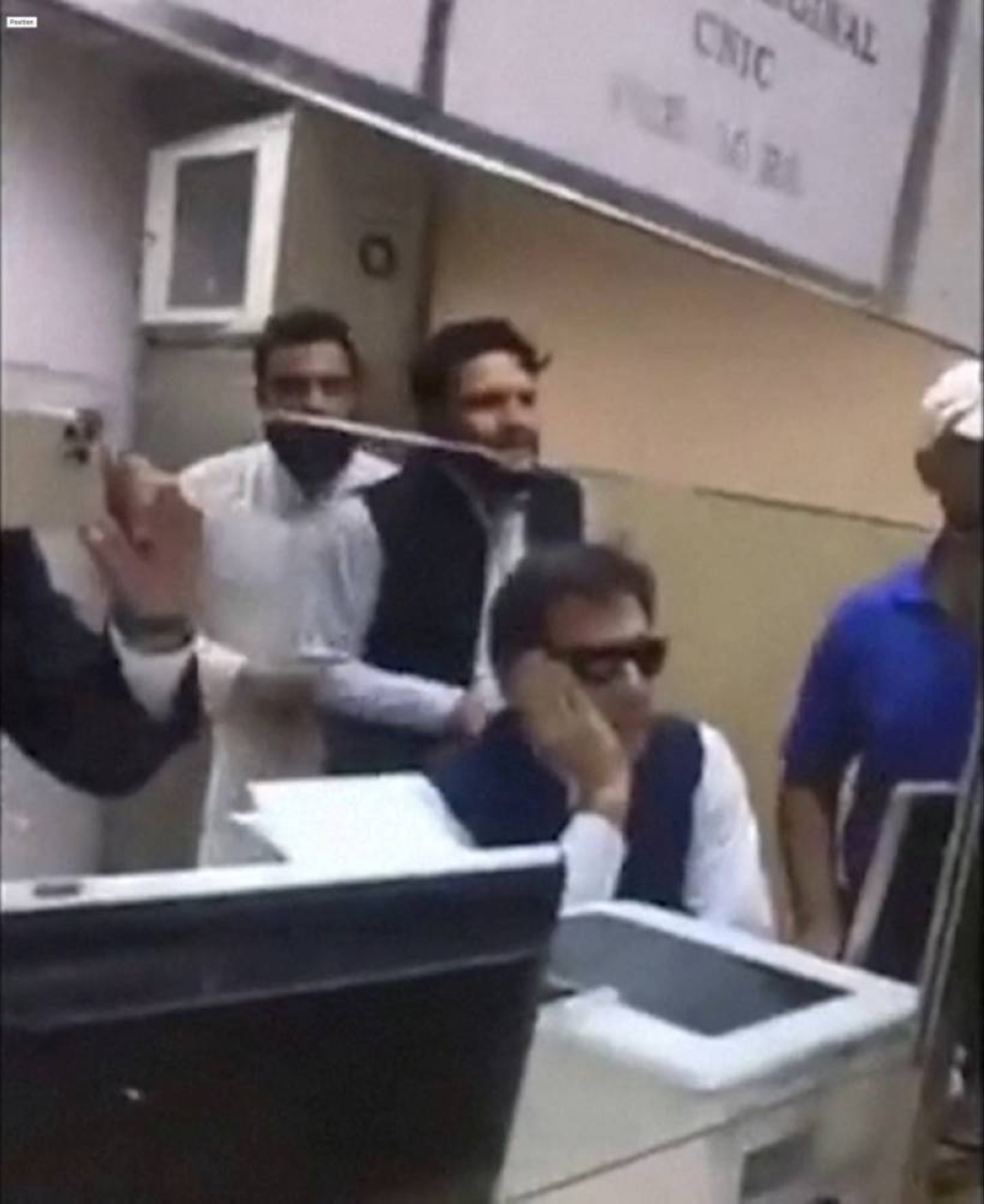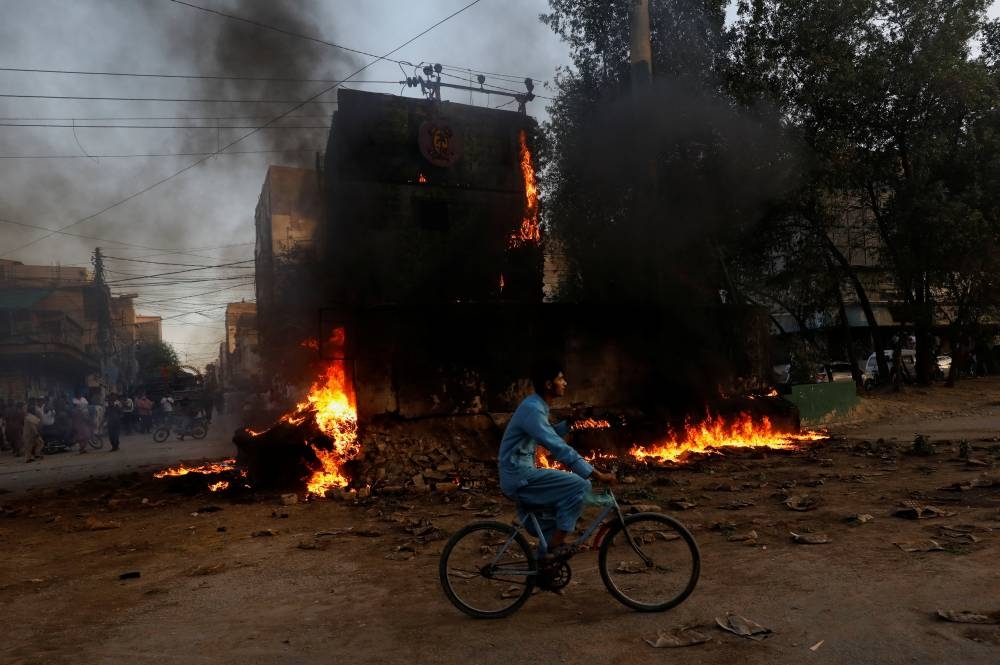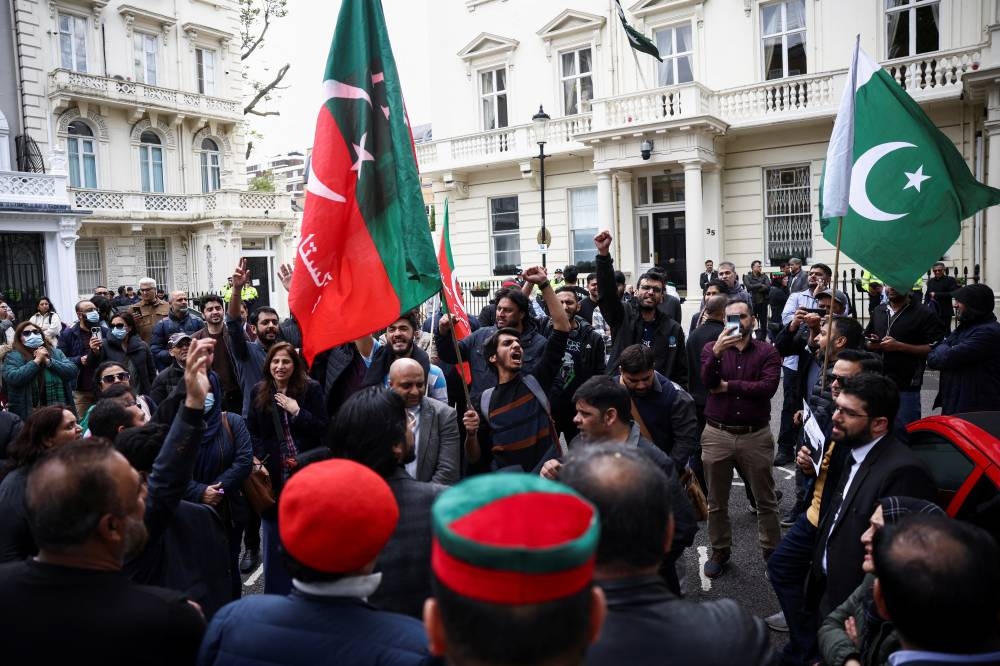- Paramilitary troops whisk away former premier from court
- One dead, 12 injured as Khan supporters clash with police
- Arrest linked to land fraud, UK money laundering -minister
- Security forces on high alert in Pakistani cities
Khan's arrest comes a day after the powerful military rebuked him for repeatedly accusing a senior military officer of trying to engineer his assassination and the former armed forces chief of being behind his removal from power last year.
Dozens of paramilitary troops in riot-control gear surrounded Khan - Pakistan's most popular leader according to opinion polls - and led him into a black van by his arm.
Authorities in three of Pakistan's four provinces imposed an emergency order banning all gatherings after Khan's supporters clashed with police, blocked major roads in a string of cities and stormed military buildings in Lahore and Rawalpindi, according to witnesses and videos shared by his party.
Reuters could not independently verify the authenticity of the videos. The military's public relations wing did not immediately respond to a request for comment.
The clashes killed one of the protesters and injured 12 people, including six police officers in the southern city of Quetta, provincial home minister Ziaullah Langove said.
Pakistan's telecommunications watchdog told Reuters that mobile data services were being suspended on interior ministry orders, while Netblocks, a global internet monitor, said access to Twitter, Facebook and YouTube had been restricted.
Khan, 70, a cricket hero-turned-politician, has showed no sign of slowing down since being ousted in April 2022 as prime minister in a parliamentary no-confidence vote - even after being wounded in a November attack on his convoy as he led a protest march to Islamabad calling for snap general elections.
His arrest came at a time when Pakistanis are reeling from the worst economic crisis in decades, with record high inflation and anaemic growth. An International Monetary Fund bailout package has been delayed for months even though foreign exchange reserves are barely enough to cover a month's imports.
Interior Minister Rana Sanaullah told reporters that Khan had been arrested by the National Accountability Bureau (NAB) after he ignored notices to turn himself in.
He said Khan and his wife were accused of having received, when he was still prime minister, land worth up to 7 billion rupees ($24.7 million) from a property developer who had been charged in Britain with money laundering.
Sanaullah added that British authorities had returned 190 million pounds ($240 million) to Pakistan in connection with money laundering, but that Khan had returned the money to the developer instead of keeping it in the national exchequer.
"Khan is accused of commission of the offence of corruption and corrupt practices," NAB said in a statement.
Khan has denied any wrongdoing.
GEO TV said he would be brought before an anti-corruption court on Wednesday.
The graft case is one of more than 100 registered against Khan since his ouster after four years in power. In most of the cases, Khan faces being barred from holding public office if convicted, with a national election scheduled for November.
Khan's Pakistan Tehreek-e-Insaf (PTI) party called on supporters to "shut down Pakistan" over his arrest. PTI wrote on Twitter: "It's your time, people of Pakistan. Khan has always stood for you, now its time to stand for him."
Hundreds of Khan supporters blocked streets in cities and major highways across the country, including in Khan's home town of Lahore and in northwestern Khyber-Pakhtunkhwa province where police went on high alert and banned public gatherings.
Protesters also blocked major roads in the port city of Karachi and police fired tear gas at protesters in the capital Islamabad, according to Reuters witnesses.
Previous attempts to arrest Khan from his Lahore home resulted in heavy clashes between his supporters and law enforcement personnel.
Political infighting is common in Pakistan, where no prime minister has yet fulfilled a full term and where the military has ruled for nearly half of the country's history.
Khan repeated his accusations against the military on Tuesday, adding that the same senior officer, Inter Services Intelligence (ISI) Major-General Faisal Naseer, was behind the murder of a renowned Pakistani journalist in Kenya in October.
The military has denied Khan's allegations.
The armed forces remain Pakistan's most powerful institution, having ruled the South Asian nation directly for close to half its 75-year history through three coups. Despite its major influence, it recently said it was no longer interfering in politics.




